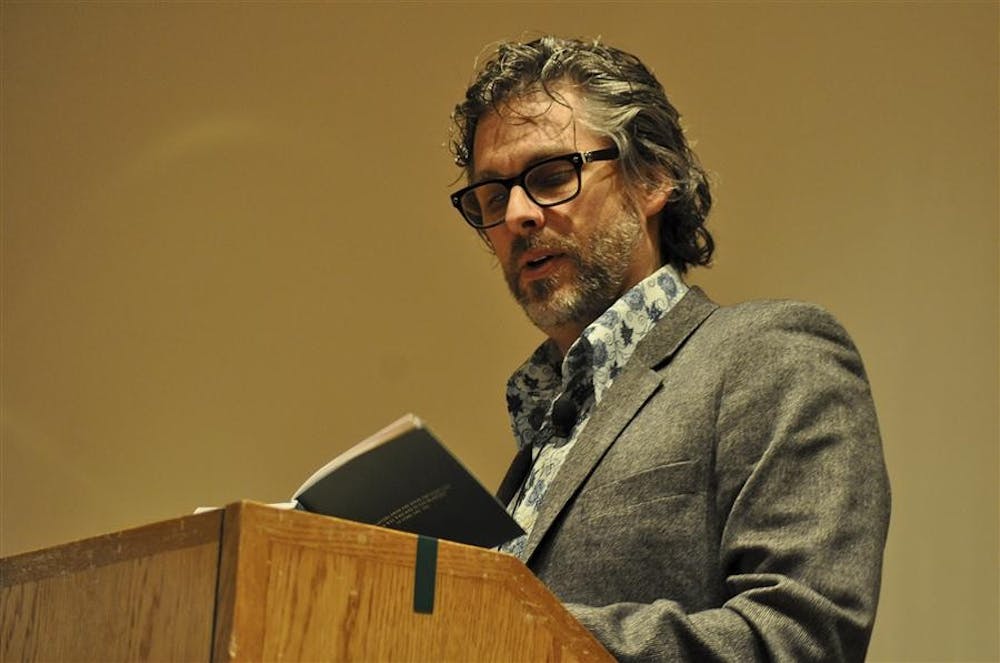Michael Chabon read five lessons he learned from his own failure to a rapt audience that sat and stood in a packed room Monday.
The failure was the Pulitzer Prize winning author’s intended second novel “Fountain City,” which he abandoned after a decade and 1,500 pages. Returning to the would-be novel more than 20 years after he started it, Chabon took the first four chapters and annotated them for the most recent edition of McSweeney’s Quarterly Concern. The annotations, he said, were his attempt to try to figure out what went wrong.
“I’ve never read from this poor, failed novel before,” Chabon said. “So whenever there’s a footnote, you will hear this.”
He pressed a button on his iPhone. Ding, ding.
“I thought that’s just what an asterisk will sound like.”
He began with the introduction.
“‘I was lost,’” he read. “‘I was 24. Rootless, feckless, homeless and mapless.’”
He described not knowing which way to turn.
“‘If only I had found, to paraphrase Beckett, a better way to fail,’” Chabon read.
Failure instructs the writer, he said, and he proceeded to list how it had instructed him.
“One. Write smaller books ... Two. Trust your gut ... Three. Don’t take advances. Sell your work only when it is complete ... Four. Persevere. Nothing succeeds like failure,” he read.
Chapter one’s epigram followed.
“‘How strange is the life of a fountain.’”
Ding, ding.
“Nathaniel Hawthorne.” His footnote described how the origin of this sentence haunted and eluded him. It wasn’t until years later that he said he actually found the quote in Hawthorne’s short story, “Egotism; or, The Bosom-Serpent.”
“‘Chapter one. The story of Harry Klezmer.’” Ding, ding. “This was the fourth iteration of the character’s name.”
Chabon described how Roger Haymaker became Ralph Haymaker, then Harry Haymaker, then Harry Klezmer when he evolved from a minister’s son to a rabbi’s.
“The story of Harry Klezmer begins like a ghost story.”
He read several paragraphs and the accompanying annotations before skipping to the afterword. Eighteen years after abandoning the story, he said he realized what went wrong.
“‘Five. Marry a strong, talented, vocal, articulate and, above all, persuasive reader,’” he read.
His first wife, he continued, didn’t see the importance of critically evaluating his work. He praised his current wife Ayelet Waldman, who he said exhibits all of those qualities.
Chabon has a mass appeal, enjoyed by both professors and teenagers. IU English professor Mary Favret said she loves his childish wonder.
“His sentences are great,” she said.
Fourteen-year-old Matthew Johnsen said his favorite novel is “The Amazing Adventures of Kavalier & Clay.”
“I liked when Kavalier was wrestling with himself in Antarctica,” he said.
Chabon spoke to a group of about 30 Hutton Honors students earlier in the day and described his own motivation for writing.
“I love to read,” he said, recounting falling in love with the voice of Sherlock Holmes stories at an early age. “I try to write books that I want to read.”
IU graduate student Patrick Coleman asked Chabon about his process.
“The middle is the worst,” Chabon said. “The most wonderful parts are those moments just before you write the first sentence. As soon as you start to write that first sentence it starts to go away. The worst is that time — I mean, the middle’s so huge, just like life.”
'Nothing succeeds like failure'

Get stories like this in your inbox
Subscribe





